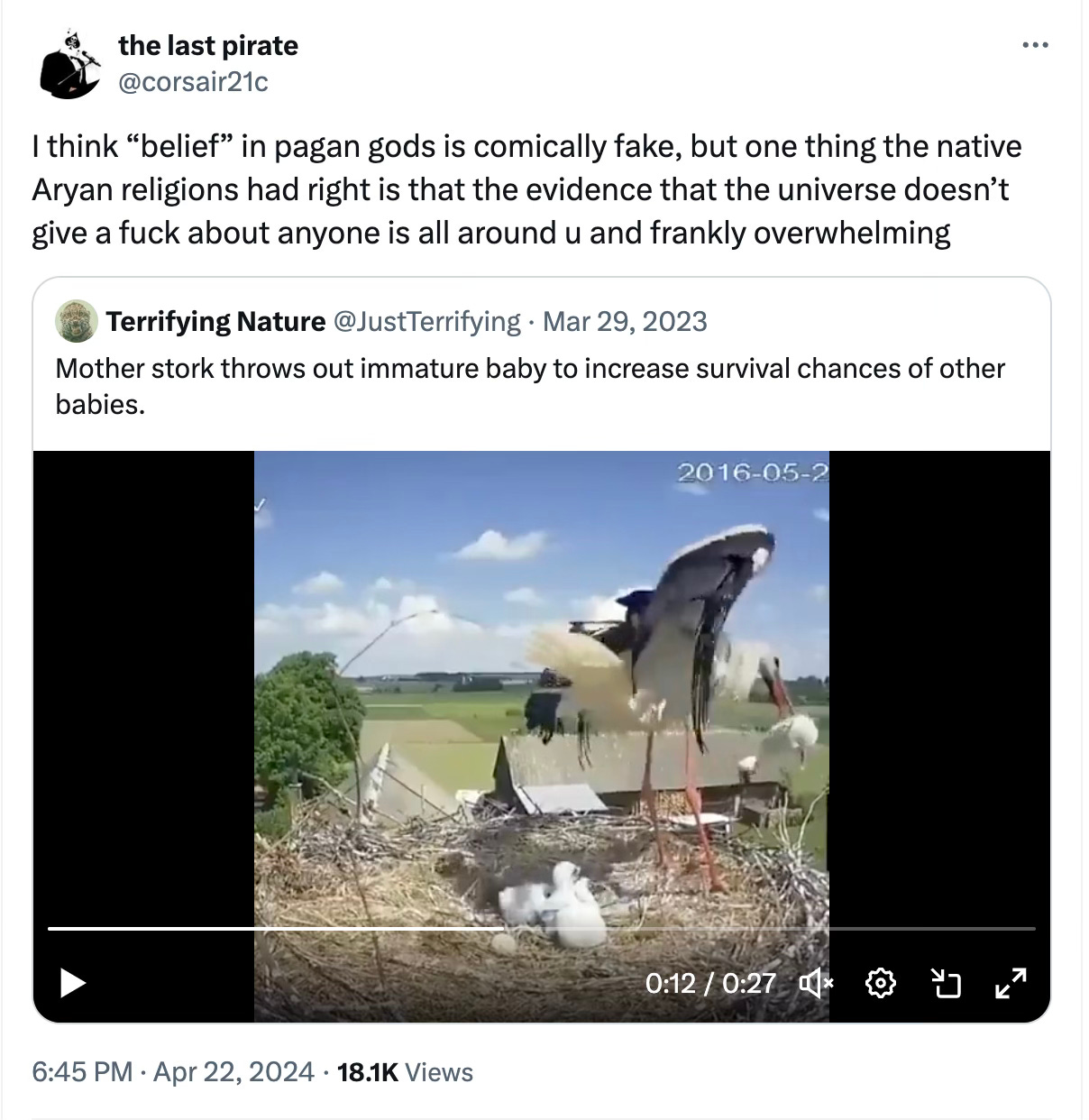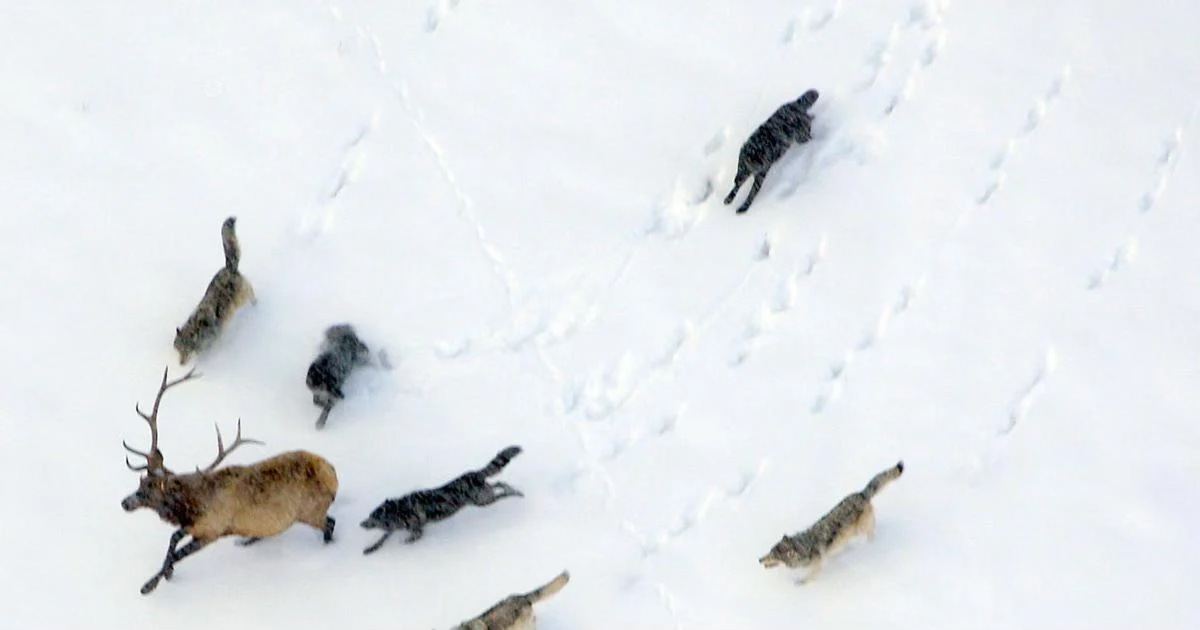I saw a tweet the other day that made me stop in my tracks and think. I share it with you now in hopes that you will do the same.
Twitter user The Last Pirate retweeted a video of a mother stork dropping a runt from her nest in order to lessen the burden of providing for her other two chicks. Last Pirate commented in response that:
I think “belief” in pagan gods is comically fake, but one thing the native Aryan religions had right is that the evidence that the universe doesn’t give a fuck about anyone is all around u and frankly overwhelming
What I find so striking about this post is that the video Last Pirate retweeted is proof for exactly the opposite conclusion than the one that he draws.
It is precisely because the mother stork cares for her babies that she is willing to kill the defective child. Her concern, by nature, with the survival of her other children is so great that she is willing to engage in infanticide.
The good of the species—of the community—is in tension with the good of the individual.
The indifference of nature towards the individual is, in this case, a manifestation of profound care for life as such. I am reminded of Plato’s Apology in which Socrates is condemned by the accuser Meletus, a man whose name quite literally means “care.” It is Meletus’ care for the city that leads him to accuse Socrates of corrupting the youth through his philosophizing. Meletus succeeds: Socrates is convicted and sentenced to death.
Meletus is willing to spill Socrates’ blood not out of indifference but from profound concern for the life of the city. From Meletus’ perspective, philosophy and political morality do not go together. To preserve the city, he must kill the treacherous philosopher Socrates. The good of the community is in tension with the good of the individual.
Meletus and that mother stork have a lot in common.
It is certainly not obvious from the example of the mother bird that the universe is indifferent to life in general or human life in particular. Sometimes it might seem that way—a forest fire ripping through homes and neighborhoods burning dozens of unwary victims to death—but, on the other hand, it is striking just how often nature is good for life.
We live on a planet that is rich in water, fertile soil, and material resources that man, through his reason, can make good for himself. Think of the remarkable presence of accessible hydrocarbons underneath the world’s surface. Because of those deposits of oil and coal, we have access to stores of energy that make possible a high degree of civilization.
There is an even greater natural resource that stands above all others in its utility for human life: reason. The ability of (some) human beings to logically work through problems is the source of a marvelous assortment of good things for man.
Last Pirate is right that nature is, in many respects, indifferent to human life and frequently outright hostile to it. But he is incorrect to state with certainty that nature “doesn’t give a fuck about anyone” simply. The evidence of our senses is more complicated than that.
Indeed, his very point that the ancient religions of the Aryans (by which he means what scholars term the ‘Indo-Europeans’) embody this truth is also questionable. The ancient Indo-European literature I am most familiar with, the Illiad and the Odyssey, reveal gods that, on the surface, are profoundly—even problematically—concerned with human life… or at least with some human beings in particular.
The Indo-European understanding of the role of the gods in human life, at least as presented by Homer, is far more thought-provoking and ambiguous than Last Pirate claims.
I bring this up because this tweet by Last Pirate is symptomatic of a wider trend I’ve noticed among a certain faction on the online right. These influencers are so dedicated to “being hard” and demonstrating their mental toughness—their willingness to stare into the abyss—that they veer into error. These types have overdosed on the ‘redpill’ as it were. It is to their own detriment.
I find it ironic that Last Pirate’s claim about the indifference of nature implicitly adopts the perspective of the crippled baby stork and not that of the mother stork or the other, healthy chicks. This is an insightful spiritual test. When you watch a video of a predator killing its prey, which animal do you sympathize with: the Hunter or the Hunted?
Do you celebrate at the victory of the wolf over the elk? Do you feel the vicious joy of conquest and long effort rewarded? Or do you put yourself in the place of the victim of nature’s cruelty, feeling the grip of terror and fear in the face of certain violent death?
I will leave it to you, dear reader, to figure out what your own answer means.
The most profound questions facing human beings do not admit of simple answers. Life is not just suffering, nor is it an endless parade of sunshine and rainbows. Mother storks killing their superfluous children are not necessarily a model for human life nor a manifestation of the world as it truly is.
If we really want to understand nature, pat answers are not enough. We will have to think. We will have to use our reason. Perhaps, in the end, the efforts of reason will show that human reason has no power to explain or justify human life. Perhaps. But how will we know for sure unless we have exhausted every other possibility?
Before us stand great mountain ranges of the mind, daring us to the ascent. Best to start climbing.





I like Elk more than wolves so seeing the wolves kill it makes me sad.
Watching crocodiles ambush and mangle their prey disgusts me. Seeing a python strangle and then swallow its prey absolutely disgusts me. Seeing hyenas just walk disgusts me.
I don’t feel the same way about the tiger with his prey, nor the leopard with his. The only time I feel disgust at a bear is when a polar bear has blood all over its face after eating a seal.
From my observations, I do not like it when I see lower forms of life and monsters mangle and devour animals that I believe to be better and more beautiful.
"Earthquakes don't kill people. Their possessions do."- Japanese proverb